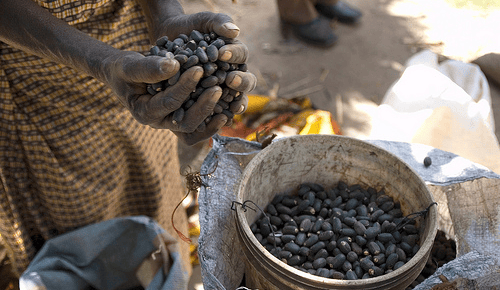
Biofuels are considered as a climate-friendly energy alternative. However, their environmental sustainability is increasingly debated because of land competition with food production, negative carbon balances and impacts on biodiversity.
Arid and semi-arid lands have been proposed as a more sustainable alternative without such impacts.
In a new study recently published on Journal of Arid Environments a team of scientists (among them the CMCC researcher Antonio Trabucco from IAFENT Division) evaluated the carbon balance of potential land conversion to Jatropha cultivation, biofuel production and use in arid and semi-arid areas. The evaluation included the calculation of carbon debt created by these land conversions and calculation of the minimum Jatropha yield necessary to repay the respective carbon debts within 15 or 30 years.
Results highlighted that land cover changes related to biofuel production create carbon debts. More in detail, considering the carbon debt of Jatropha plantations in global arid and semi-arid lands, there is no carbon debt when converting agricultural lands (but it impacts food production) or marginal lands, as it occurs in shrubland and forests. Repayment of carbon debts from conversion of shrublands within 30 years requires high yields (3.5 – 3.9 t seed ha−1 yr−1), while carbon debts caused by conversion of dryland forests into Jatropha cannot be compensated within one human generation.
The abstract of the paper:
Biofuels are considered as a climate-friendly energy alternative. However, their environmental sustainability is increasingly debated because of land competition with food production, negative carbon balances and impacts on biodiversity. Arid and semi-arid lands have been proposed as a more sustainable alternative without such impacts. In that context this paper evaluates the carbon balance of potential land conversion to Jatropha cultivation, biofuel production and use in arid and semi-arid areas. This evaluation includes the calculation of carbon debt created by these land conversions and calculation of the minimum Jatropha yield necessary to repay the respective carbon debts within 15 or 30 years.
The carbon debts caused by conversion of arid and semi-arid lands to Jatropha vary largely as a function of the biomass carbon stocks of the land use types in these regions. Based on global ecosystem carbon mapping, cultivated lands and marginal areas (sparse shrubs, herbaceous and bare areas) show to have similar biomass carbon stocks (on average 4–8 t C ha−1) and together cover a total of 1.79 billion ha. Conversion of these lands might not cause a carbon debt, but still might have a negative impact on other sustainability dimensions (e.g. biodiversity or socio-economics). Jatropha establishment in shrubland (0.75 billion ha) would cause a carbon debt of 24–28 t C ha−1 on average (repayable within 30 year with yield of 3.5–3.9 t seed ha−1 yr−1). Land use change in the 1.15 billion ha of forested area under arid and semi-arid climates could cause a carbon debt between 70 and 118 t C ha−1. This debt requires 8.6–13.9 t seed production ha−1 yr−1 for repayment within 30 years. If repayment is required within 15 years, the necessary minimum yields almost double. Considering that 5 t seed ha−1 yr−1 is the current maximum Jatropha yield, conversion of forests cannot be repaid within one human generation. Repayment of carbon debt from shrubland conversions in 30 years is challenging, but feasible. Repayment in 15 year is currently not attainable.
Based on this analysis the paper discusses the carbon mitigation potential of biofuels in arid and semi-arid environments.
Read the integral version of the paper:
Achten W. M. J. , Trabucco A., Maes W. H. , Verchot L. V. , Aerts R., Mathijs E., Vantomme P., Singh V. P. , Muys B.
Global greenhouse gas implications of land conversion to biofuel crop cultivation in arid and semi-arid lands – Lessons learned from Jatropha
2013, Journal of Arid Environments, Pages 135-145


